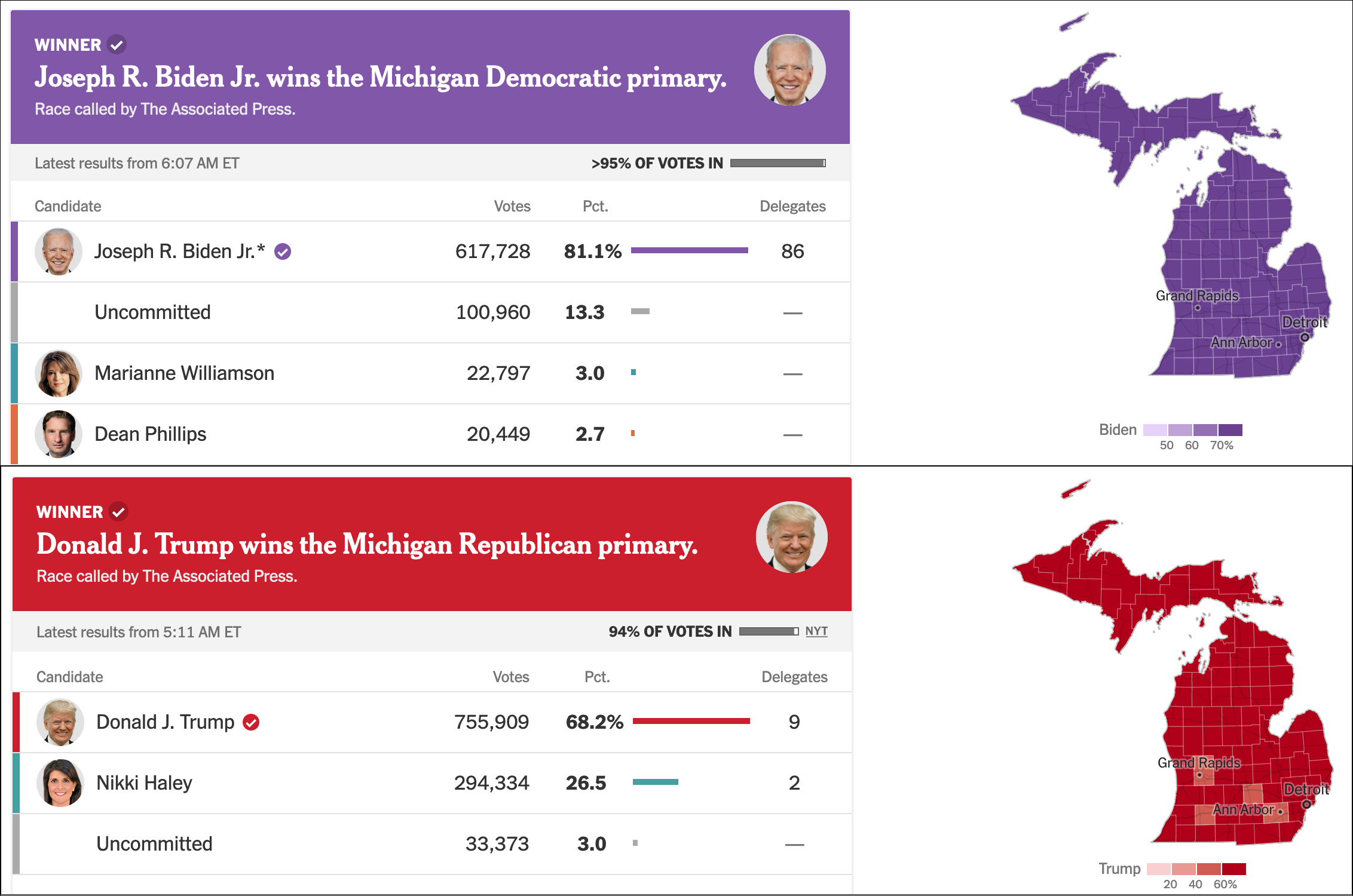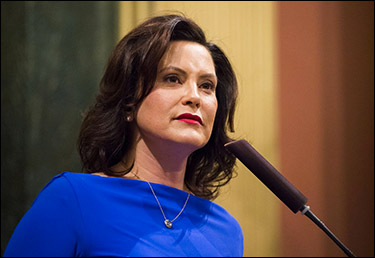By Jim Ellis — Wednesday, Feb. 28, 2024
President
Michigan: Primary Results — As expected, President Joe Biden and former President Donald Trump easily captured large percentages in winning last night’s respective Democratic and Republican Michigan presidential primary elections.
President Biden recorded 81.1 percent of the Democratic vote, though just under 14 percent voted for the Uncommitted Delegate Slate. US Rep. Rashida Tlaib (D-Detroit) was encouraging Democratic voters to choose that option as a way to protest President Biden’s position regarding the Israel-Hamas conflict. For the Republicans, Trump attracted 68.2 percent of the GOP vote, again consistent with the result most pollsters predicted. Overall turnout favored Republicans approximately 1.13 million to about 778,000 individuals.
The Wolverine State primary represents the final installment of the pre-Super Tuesday voting events. The next primaries will occur on March 5 where 16 entities will cast primary or caucus ballots in either Democratic or Republican nomination events.
Senate
Wisconsin: Sen. Baldwin +7 Over Hovde — Businessman Eric Hovde (R) announced his US Senate candidacy in the Badger State last week, and this week we see the first polling pairing with two-term incumbent Sen. Tammy Baldwin (D). Emerson College released their latest Wisconsin survey (Feb. 20-24; 1,000 registered Wisconsin voters; multiple sampling techniques) and while the sampling universe would support Donald Trump 44-42 percent, Democratic incumbent Baldwin would lead the Senate race 46-39 percent.
The poll might look more encouraging for Republicans at first glance since Sen. Baldwin is under 50 percent and has only a single digit lead against a relatively unknown opponent. The polling universe, however, features more Republicans than Democrats, 35-33 percent with an additional 32 percent responding as non-affiliated. Though Wisconsin does not register voters by political party, voter history suggests that the poll, though weighted to reflect the actual electorate, appears to have a slight Republican skew.
House
New York: Dems Unveil New Cong Map — The Democratic super majority in the state Assembly and Senate unveiled a new congressional map that surprised many, but in retrospect the plan is an indication the party leaders knew they would face tough going on a legal challenge if they stretched their partisan interests much further.
As reported earlier, the state’s Citizens Redistricting Commission made only cosmetic changes in the plan the court created for the 2022 election. Though that map only gave Republicans a clear partisan plurality in just three of the state’s 26 seats according to the Dave’s Redistricting App statisticians, the GOP candidates won 11 races. The Citizens Commission members left the court footprint largely intact, which the legislature then rejected. When the people adopted a citizens’ redistricting commission ballot proposition, the process allowed the legislature to either approve or reject the commission adopted plans.
The surprising end to this story is the legislature’s own map is another “least change” map from the court’s original footprint, which very likely means that the 2024 New York congressional playing field will be almost identical to what we saw in 2022.
TN-7: Delegation Attempting to Convince Rep. Green to “Un-retire” — So far in this election cycle, we’ve seen two US House members, Reps. Pat Fallon (R-TX) and Victoria Spartz (R-IN), announce their retirements only to change their mind and seek re-election. We may soon have a third. Public reports are coming from Tennessee where the Republican congressional delegation, including Sen. Marsha Blackburn (R) who previously represented the 7th District during her career in the House, are publicly encouraging Rep. Mark Green (R-Clarksville), the chairman of the House Homeland Security Committee, to change his mind about retiring. Last week, Rep. Green announced he would not seek a fourth term.
The Tennessee candidate filing deadline is April 4 for the Aug. 1 primary, so it is possible we may soon see one less open House seat.







